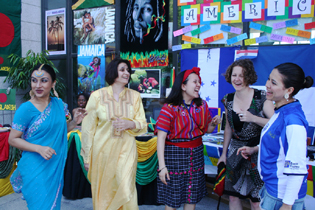
Ten years have passed since the Ewha Graduate School of International Studies (GSIS) was established in March, 1997. So the GSIS decided to designate May as GSIS month and held its 10th Year Celebration from May 21 to 22.
The first day of the celebration featured a commemorative ceremony, followed by the International Cultural Festival, a multi-cultural exhibition prepared by GSIS students in the LG Convention Hall. On May 22, an academic conference titled, “Looking Back, Looking Forward” was held at the Korea Chamber of Commerce & Industry with international studies scholary from various universities, including Seoul National University and Yonsei University, attending. The conference looked back upon the ten years of Ewha's GSIS and looked forward future development and cooperation among departments of international studies.
Ewha GSIS was established to foster global leaders fit to lead a globalized 21st century world. The Korean government awarded Ewha a five-year grant to establish the GSIS, after evaluating Ewha’s commitment to produce global women leaders who would break the glass ceilings in society. From 1996 to 2001, Ewha GSIS was ranked top among all GSIS programs, by the Ministry of Education.
In its ten years, the Ewha GSIS has produced about 400 graduates working around the world, and it has maintained a nearly 100 percent employment rate since its first graduating class. Ewha GSIS graduates are working in international organizations such as the UN, World Bank, and IMF; in government and public institutions like the Ministry of Foreign Affairs and Trade and Ministry of Finance and Economy; and in corporations like the Goldman Sachs Group and Citybank.
Ewha GSIS is mostly known for its balanced faculty and its comprehensive curriculum. Current GSIS faculty consists of five foreign and seven Korean professors. “The ratio between foreign and Korean professors is highly balanced to attract good students,” said Choi Byung-il, the Dean of Ewha GSIS. “Although many Korean universities have difficulties recruiting eminent foreign professors because
Ewha GSIS’s comprehensive curriculum begins with in-class lectures and seminars with various prominent professionals in society. Students then have the advantage of taking short or long term internships at domestic and international institutions. Ewha GSIS is also the only university in
“Over the last ten years, we have tried to set up principles for international studies and its importance to the 21st century. We came to the conclusion that international studies is an interdisciplinary study, which deals with various conflicts occurring around the world, considering each country's special political and economic status and cultural diversity. Since it has become more difficult to understand international issues when only considering the consistency of international law and economic efficiency, international studies will take on a more important role in the future,” said Choi. “Currently about 30 percent the GSIS students are international students from about 28 countries, including those in Asia and

